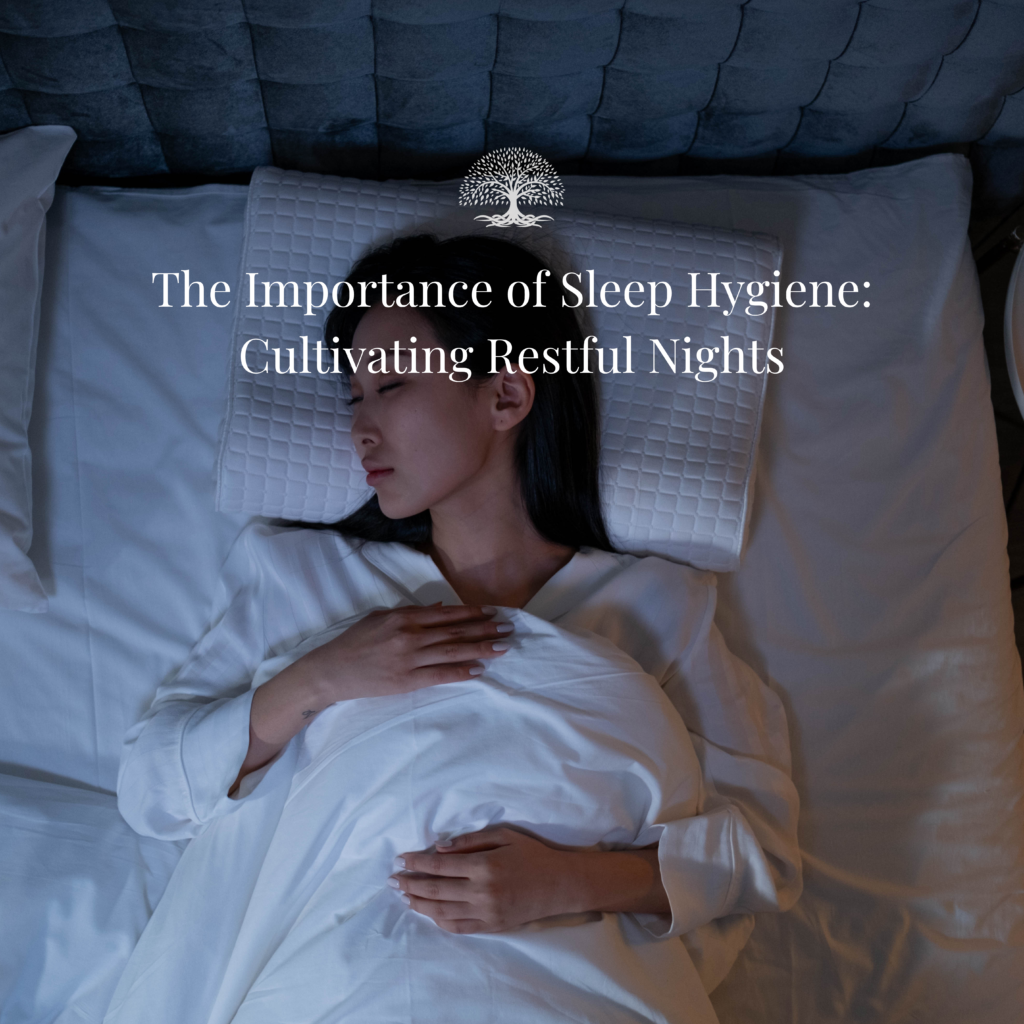The Importance of Sleep Hygiene: Cultivating Restful Nights

At Harvest Life, we understand that sleep is a cornerstone of overall wellness. The quality of our sleep significantly impacts our physical health, emotional well-being, and daily performance. Practicing good sleep hygiene is crucial for fostering restorative sleep, and it can be transformative in how we feel each day.
Let’s explore the importance of sleep hygiene, identify common culprits of poor sleep, and discover practical solutions to enhance your sleep routine.
Understanding Sleep Hygiene
Sleep hygiene refers to the habits and practices that promote better sleep quality. Establishing a consistent routine and creating a restful environment are essential to achieving restorative sleep. Here’s an example of a good sleep routine to inspire your nightly practices:
Some examples of how we practice good sleep hygiene:
1. Wind Down (1 Hour Before Bed): Begin your wind-down period by dimming the lights and turning off electronic devices. This signals your body that it’s time to relax. Engage in calming activities like reading, gentle stretching, or meditation.
2. Create a Comfortable Sleep Environment: Ensure your bedroom is cool, dark, and quiet. Use blackout curtains, earplugs, or white noise machines if necessary. Invest in a comfortable mattress and pillows to support restful sleep.
3. Set a Consistent Sleep Schedule: Aim to go to bed and wake up at the same time every day, even on weekends. This consistency helps regulate your body’s internal clock, improving your overall sleep quality.
4. Limit Stimulants: Avoid caffeine or heavy meals in the hours leading up to bedtime. Instead, consider a soothing herbal tea to help prepare your body for sleep. We find a cut-off hour for caffeine a good technique (such as no caffeine after 3pm).
5. Practice Relaxation Techniques: Incorporate relaxation exercises such as deep breathing, progressive muscle relaxation, or guided imagery to ease into sleep.
6. Lavender Essential Oil: Try sprinkling several drops of lavender on the top of your duvet (avoid dropping directly onto your pillow or it might irritate your eyes.
7. Acupuncture: Acupuncture reduces stress and anxiety, balancing energy flow, and stimulating the release of neurotransmitters that regulate sleep patterns.
8. Magnesium Supplements: Magnesium regulates melatonin production, promoting relaxation, and reducing symptoms of insomnia through its calming effects on the nervous system.

Causes of Bad Sleep
Several factors can lead to poor sleep quality. Common causes include:
- Stress and Anxiety: Overthinking or worrying about daily life can make it difficult to unwind and fall asleep.
- Poor Sleep Environment: Discomfort from noise, light, or an unsuitable mattress can disrupt your rest.
- Irregular Sleep Schedule: Inconsistent sleep patterns can confuse your body’s internal clock, leading to difficulty falling asleep or waking up.
- Excessive Screen Time: Exposure to blue light from screens can inhibit melatonin production, making it harder to fall asleep.
Effects of Bad Sleep
The consequences of inadequate sleep can be far-reaching and detrimental to your wellbeing. Poor sleep can lead to:
- Physical Health Issues: Increased risk of obesity, diabetes, cardiovascular disease, and weakened immune function.
- Mental Health Struggles: Heightened anxiety, depression, irritability, and mood swings.
- Cognitive Impairment: Decreased attention, memory, and decision-making abilities, affecting both work and daily life performance.
Ways to Overcome Sleep Challenges
Improving your sleep hygiene can combat these issues and enhance the quality of your sleep.
Here are some actionable strategies:
- Establish a Bedtime Routine: Consistency is key. Following a calming pre-sleep routine can signal your body that it’s time to wind down.
- Limit Naps: While short power naps can be beneficial, avoid long or irregular napping during the day, as it can interfere with night-time sleep.
- Stay Active: Regular physical activity can promote better sleep, but try to complete workouts earlier in the day to avoid exercise-induced restlessness at night.
- Mindfulness and Relaxation: Incorporate mindfulness practices such as meditation, yoga, or journaling to reduce stress and promote relaxation before bedtime.
- Consider Professional Support: If sleep issues persist, consider consulting a healthcare professional or sleep specialist to address underlying conditions.
Further Education: Podcasts to Explore
To deepen your understanding of sleep hygiene and enhance your sleep quality, consider tuning into the following podcasts:
- “The Sleepy Time Mumbles” – Offers insights on sleep science, tips for better sleep, and calming stories to aid relaxation.
- “Sleep Better” – Discusses practical sleep strategies and interviews experts in sleep health.
- “Sleepy Time” – Features soothing stories aimed at children and meditations specifically designed to help listeners drift off into a peaceful slumber.
At Harvest Life, we believe that prioritising sleep hygiene is essential for holistic wellness. By focusing on your sleep habits and creating an environment conducive to rest, you can foster a healthier, more balanced life.
Remember, nurturing your mind and body with restorative sleep is not just an act of self-care; it’s a foundation for thriving in all areas of life.
Take the time to assess your sleep habits and make small adjustments for a better night’s rest—you deserve it!


